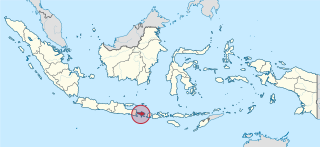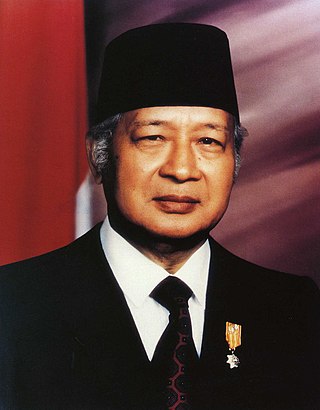Related Research Articles

Bali is a province of Indonesia and the westernmost of the Lesser Sunda Islands. East of Java and west of Lombok, the province includes the island of Bali and a few smaller offshore islands, notably Nusa Penida, Nusa Lembongan, and Nusa Ceningan to the southeast. The provincial capital, Denpasar, is the most populous city in the Lesser Sunda Islands and the second-largest, after Makassar, in Eastern Indonesia. Denpasar metropolitan area is the extended metropolitan area around Denpasar. The upland town of Ubud in Greater Denpasar is considered Bali's cultural centre. The province is Indonesia's main tourist destination, with a significant rise in tourism since the 1980s, and becoming an Indonesian area of overtourism. Tourism-related business makes up 80% of the Bali economy.

Indonesia, officially the Republic of Indonesia, is a country in Southeast Asia and Oceania, between the Indian and Pacific oceans. It consists of over 17,000 islands, including Sumatra, Java, Sulawesi, and parts of Borneo and New Guinea. Indonesia is the world's largest archipelagic state and the 14th-largest country by area, at 1,904,569 square kilometres. With over 280 million people, Indonesia is the world's fourth-most-populous country and the most populous Muslim-majority country. Java, the world's most populous island, is home to more than half of the country's population.

Minangkabau people, also known as Minang, are an Austronesian ethnic group native to the Minangkabau Highlands of West Sumatra, Indonesia. The Minangkabau's West Sumatera homelands was the seat of the Pagaruyung Kingdom, believed by early historians to have been the cradle of the Malay race, and the location of the Padri War.

Suharto was an Indonesian military officer and politician, who served as the second and the longest serving President of Indonesia.

The National Awakening Party, frequently abbreviated to PKB, is an Islam-based political party in Indonesia. It is also the party of the former Vice President of Indonesia, Ma'ruf Amin, who was elected to its Shura Council.
Indonesia is divided into provinces. Provinces are made up of regencies and cities (kota). Provinces, regencies, and cities have their own local governments and parliamentary bodies.

In Indonesia, village or subdistrict is the fourth-level subdivision and the smallest administrative division of Indonesia below a district, regency/city, and province. Similar administrative divisions outside of Indonesia include barangays in the Philippines, Muban in Thailand, civil townships and incorporated municipalities in the United States and Canada, communes in France and Vietnam, dehestan in Iran, hromada in Ukraine, Gemeinden in Germany, comuni in Italy, or municipios in Spain. The UK equivalent are civil parishes in England and communities in Wales. There are a number of names and types for villages in Indonesia, with desa being the most frequently used for regencies, and kelurahan for cities or for those communities within regencies which have town characteristics. According to the 2019 report by the Ministry of Home Affairs, there are 8,488 urban villages and 74,953 rural villages in Indonesia. North Aceh Regency contained the highest number of rural villages (852) amongst all of the regencies of Indonesia, followed by Pidie Regency with 730 rural villages and Bireuen Regency with 609 rural villages. Prabumulih, with only 12 rural villages, contained the fewest. Counted together, the sixteen regencies of Indonesia containing the most rural villages—namely, North Aceh (852), Pidie (730), Bireuen (609), Aceh Besar (604), Tolikara (541), East Aceh (513), Yahukimo (510), Purworejo (469), Lamongan (462), South Nias (459), Kebumen (449), Garut (421), Bojonegoro (419), Bogor (416), Cirebon (412), and Pati (401)—contain one-third of all the rural villages in Indonesia. Five of these are located in Aceh, two in Highland Papua, three in Central Java, two in East Java, three in West Java, and one in North Sumatra. An average number of rural villages in the regencies and 15 cities of Indonesia is 172 villages. A village is the lowest administrative division in Indonesia, and it is the lowest of the four levels. The average land area of villages in Indonesia is about 25.41 km2 (9.81 sq mi), while its average population is about 3,723 people.
Nedebang is a Papuan language spoken in the villages of Balungada and Baulang in the eastern district of Pantar island in the Alor archipelago of Indonesia. There are also Nedebang speakers in Air Panas, administratively part of Balungada but located 1 km from the main village.

The Japanese Empire occupied the Dutch East Indies during World War II from March 1942 until after the end of the war in September 1945.

Stanley Ann Dunham was an American anthropologist who specialized in the economic anthropology and rural development of Indonesia. She was the mother of Barack Obama, the 44th president of the United States.

The Manggarai language is the language of the Manggarai people from the western parts of the island of Flores, in East Nusa Tenggara Province, Indonesia.
Mawes was a Papuan language of Indonesia.
Tombulu, also known as Minahasan language, is an Austronesian language of northern Sulawesi in Indonesia. It is a Minahasan language, a sub-group of the Philippine languages.
Kimki (Aipki) or Sukubatom (Sukubatong) is a South Pauwasi language of Batom District, Pegunungan Bintang Regency, Papua, Indonesia. Foley classifies Kimki as a language isolate, although he notes some similarities with Murkim. Usher demonstrates a connection to the other South Pauwasi languages.
The Topoiyo language is an Austronesian language of West Sulawesi, Indonesia spoken by people in Tabolang Village, Topoyo District, Central Mamuju Regency, West Sulawesi. Usually, Topoiyo speakers also speak Mamuju and Indonesian. Topoiyo is also spoken in other villages in Topoyo District, such as Salulebo, Topoyo, and Salupangkang villages.
Paku (Bakau) is an Austronesian language spoken in four villages in the East Barito Regency of Central Kalimantan province, Indonesia. It is closely related to the Malagasy language spoken on Madagascar. Most of the remaining speakers are also fluent in other languages. The use of the language is decreasing and speakers are increasingly shifting to Ma'anyan, a lingua franca of East Barito. In 2018, it was estimated there was about 50 speakers of the language in the villages of Tampa, Tarinsing, Bantei Napu, and Kalamus in the regency of East Barito.
Lorang is an Austronesian language of the Aru Islands in eastern Indonesia. It is spoken in one village on Koba Island.

The Thousand Islands are a chain of islands to the north of Jakarta's coast. It forms the only regency of Special Capital Region of Jakarta, the metropolitan province of Indonesia. It consists of a string of 342 islands stretching 45 km (28 mi) north into the Java Sea at West Jakarta Bay and in fact are located to the north of Banten Province. Pramuka Island is the regency seat. The islands, along with North Jakarta City, are the only administrative divisions of Jakarta Special Capital Region with a coastline.
A kampong is a term for a type of village in Brunei, Indonesia, Malaysia and Singapore and a "dock" in Cambodia. The term applies to traditional villages, especially of indigenous peoples. This term has also been used to refer to urban slum areas or enclosed developments and neighborhoods within towns and cities in Brunei, Indonesia, Malaysia, Singapore, Cambodia, Sri Lanka, and Christmas Island. The design and architecture of traditional kampong villages have been targeted for reform by urbanists and modernists. These villages have also been adapted by contemporary architects for various projects.

Kemayoran Athletes Village is a building complex located in Kemayoran District, Jakarta, Indonesia. The site was developed as the athlete's village for the 2018 Asian Games and 2018 Asian Para Games which was held in Jakarta, built on an area of 10 hectares land, which had 7,424 apartments in 10 towers. Total accommodation capacity of 22,272 at the village exceeded International Olympic Committee standards, which require Olympics hosts to provide rooms for at least 14,000 athletes.
References
- ↑ Haug, Michaela; Rössler, Martin; Grumblies, Anna-Teresa (2016-07-15). Rethinking Power Relations in Indonesia: Transforming the Margins. Routledge. p. 141. ISBN 978-1-317-33332-6.